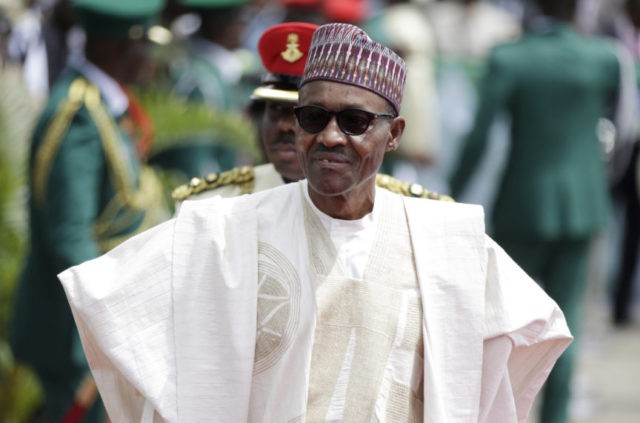Nigerian President Muhammadu Buhari’s government welcomed Venezuela’s top diplomat to the country this week, just as Abuja honors North Korea with floral arrangements to honor Kim Jong-il and Eternal President Kim Il-sung.
The courting of two of the world’s most notorious rogue regimes at the same time raises concerns regarding Buhari’s alliances as the nation continues its ongoing struggle against Islamic State-affiliate Boko Haram and, despite being an OPEC member nation, received more than $718 million in American taxpayers’ dollars in 2016.
The Venezuelan news outlet Globovisión reports that Foreign Minister Jorge Arreaza arrived in Abuja Monday for what Venezuela’s socialist regime is calling “The Tour of Dignity.” The tour, meant to attract support from international leftists for the failing regime, previously sent Arreaza to Haiti, Trinidad and Tobago, Dominica, El Salvador, Surinam, Nicaragua, and the Dominican Republic. In addition to meeting Nigerian officials, Arreaza met with the ambassadors from Cuba and Syria and a representative of the Palestinian territories.
Now Arreaza is in “Mother Africa” to sign economic agreements that may help keep the nation’s catastrophic economic from collapsing entirely. According to the Venezuelan Foreign Ministry, Arreaza met with counterpart Geoffrey Onyeama to sign “agriculture, infrastructure, and education agreements.”
“The agreements we signed today are strategic to fortify dialogue and cooperation between our countries, creating abilities in education and developing talent,” Onyeama said.
“We will support the government of Venezuela, promote the increase in commercial relations and hope that peace and stability reign soon in the country, because Venezuela has great potential and resources that we believe should be at the service of the Venezuelan people,” he added.
Venezuela is believed to possess the world’s largest oil reserves, yet is home to one of the least valuable currencies in the world, the bolívar, thanks to nearly two decades of socialist policies. Torn apart by corruption, the state-run oil corporation PDVSA is losing thousands of employees a week and at least $300 billion have gone missing from its coffers.
Like Venezuela, Nigeria is one of the world’s most corrupt nations. According to a government survey taken last year, the average Nigerian pays six bribes to government officials a year, and almost half of Nigerians who came into contact with police in any capacity paid a bribe. Few suffer consequences; when caught this year, one Nigerian government clerk claimed that an “unidentified spiritual snake” stole the $100,000 that had gone missing under their control.
Venezuela has long courted Africa’s largest economy as an ally, having found itself largely abandoned in Latin America as countries began voting in right-leaning leaders, fearful of suffering Venezuela’s fate. Dictator Nicolás Maduro announced early this month while welcoming a new Nigerian ambassador to Caracas.
Venezuela’s ally North Korea has also worked to publicize support from Buhari. On Monday, the government-controlled Korean Central News Agency (KCNA) published a story boasting that Buhari had personally sent “a floral basket to the statues of President Kim-il Sung and leader Kim Jong-il on Mansu Hill on the occasion of the Day of the Shining Star.”
North Korea refers to Kim Jong-il’s birthday as the “Day of the Shining Star.”
KCNA’s announcement follows an event commemorating the holiday at North Korea’s embassy in Abuja in which North Korean officials asserted a desire for closer relations between Nigeria and Pyongyang.
“We hope to build on the traditional relationship and cooperation between the Federal Republic of Nigeria and Korea. We hope to consolidate and sustain the existing peace and security,” Ambassador Jong Yong-chol said. “This is because the revolutionary of Kim Jong-il today is successfully and succeeded by Kim Jong-un, the supreme leader of our party and people towards promoting peace.”
North Korea has long pursued close ties to Africa, offering weapons and military training in exchange for pivotal funding to keep the communist economy afloat. Nigeria has not been an exception. In 2015, as Buhari took over for predecessor Goodluck Jonathan, Abuja and Pyongyang signed an agreement “facilitate the exchange of experts, technicians, and university professors between the DPRK and Nigerian universities.”
Buhari won the presidency on a campaign to eradicate Boko Haram, using his past as a military dictator to assert that he would swiftly destroy the group. Buhari did, as promised, declare victory over Boko Haram in December 2015, though he did so without actually defeating the group. Boko Haram remains very much active in Nigeria, razing villages and using abducted girls as suicide bombers.
Nigerians have begun to notice, which may compromise any hope Buhari has to win re-election in 2019. It is not clear whether Buhari, 75, would choose to run for a second term, but Nigerian publications have reported that he is interested in doing so. If he does, he would have to work on improving his approval ratings, which plummeted from 80 percent in 2015 to 45 percent in December 2017. Officials around Buhari insist that he has yet to decide.

COMMENTS
Please let us know if you're having issues with commenting.